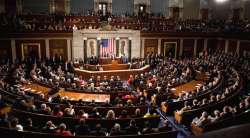Pakistan's descent into violence rooted in its intolerance to religious diversity: US Congressmen
Reform of the passport regime and the electoral process can be achieved through purely administrative and executive action by the Pakistani government: neither issue requires legislative action, they said.

Pakistan has failed to arrest the country's descent into violence mainly due to its intolerance to religious diversity, two top US lawmakers have said, expressing concern over the continued disenfranchisement of the Ahmadi Muslims.
In the face of the apartheid-like regime, it is hardly surprising that the rhetoric of extremist madrassahs resonates with millions of Pakistanis, making the country a sanctuary for terrorists carrying out increasingly deadly attacks, Congressmen Jackie Speier and Peter King wrote in an op-ed in The Hill newspaper published yesterday.
Indeed, daily life for all Pakistanis, not just for Ahmadi Muslims, is full of constant reminders that the country is legally segregated along sectarian lines, they said.
"Some may find it puzzling that despite a quarter century of ostensibly liberal government, Pakistan has failed to arrest the country's descent into violence that is directly rooted in intolerance of religious diversity," they said.
"But they need look no further than the continued disenfranchisement of Ahmadi Muslims, including in the most recent elections held last week," said Speier and King, who are also co-chairs of the Congressional Ahmadiyya Muslim Caucus.
In order to obtain a passport, an identity card, and even to enroll in college, Pakistanis must list their religious affiliation and to be counted as 'Muslims', they must sign a sworn declaration stating that Ahmadis are non-Muslims and that the founder of the Community, Mirza Ghulam Ahmad, is an 'impostor' prophet, the two Congressmen said.
The two US lawmakers called for restoring the franchise of Ahmadis in Pakistan.
Reform of the passport regime and the electoral process can be achieved through purely administrative and executive action by the Pakistani government: neither issue requires legislative action, they said.
Restoring the franchise to Ahmadis, for example, would require only rescinding Pakistani Presidential Order No. 15 of 2002 ('Executive Order No. 15'), which uniquely excludes Ahmadis from the joint electoral rolls, and requires them to be registered on a separate supplementary voter roll, they said.
"We cannot afford to let another five-year election cycle pass before the critical issue of restoring the full and free right to vote for Ahmadi Muslims is resolved once and for all. Buoyed by the success of the Religious Freedom Ministerial, the secretary of State has a golden opportunity to help correct a long-standing injustice," Speier and King added.